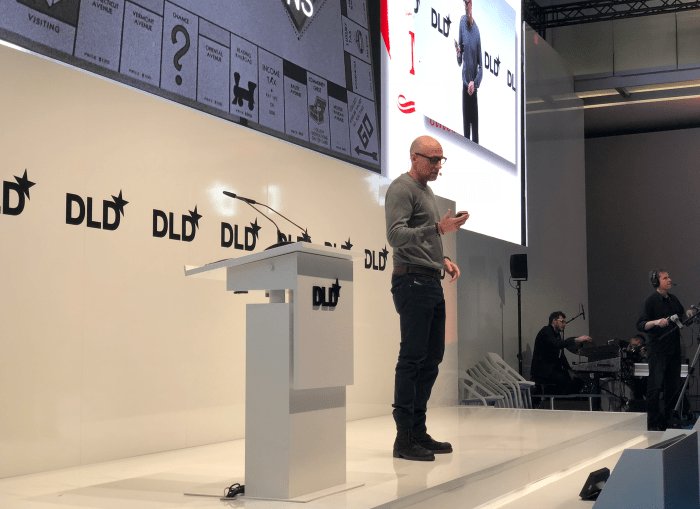
I’ve been mostly travelling since the DLD conference, so just catching up on my notes and reflections now.
Scott Galloway was one of the people I was really keen to see speak in Munich. His recent book The Four was one of my best reads of 2017 – I bought several copies for our office and recommend on Brilliant Noise reading lists for our digital mindset and leadership programmes.
What sets Galloway apart from most tech commentators is that he does his homework, brings fresh insights and lays out his thinking in an engaging but above all provocative style. This year’s theme of his annual DLD talk was close to the bone for many of the attendees – the break up of big tech.
Galloway repeated and build on the themes in his book about “the four” – Amazon, Google, Facebook and Apple – essentially that they are now so big that they are destroying more value than they are creating. Amazon and Facebook seemed to take the most flak in the talk.
Here are some themes and highlights, depending on your point of view:
- Facebook is a media company and disingenuous in pretending it isn’t: “[Facebook says] We can’t be arbiters of the truth and you don’t want us to be.’ No, we’d like you to try.”
The four treat fines from breaking the law as costs of doing business. In proportion to the size of deals they are getting “$25 parking tickets”.

While Amazon dwarfs all other retailers it pays hardly any tax (see below).
What happens when the most successful companies in the world don’t pay taxes? Simple, the less successful companies pay more taxes. We have opted for a regressive corporate tax system.

The four will destroy almost 200,000 jobs in the advertising industry.

These have been fantastic vessels for the transfer of wealth from the rest of the world to the United States and from the middle of the United States to the coasts.
He also used “the shitshow” of Amazon’s HQ2 location selection process. US cities effectively bid against one other to be the one that waived its tax and other. Laws the most to attract the company to settle there.
At one point he suggested that the Chinese response to big tech had been effective from a national security point of view – ban the US company, support local versions of e-commerce, search and social and effectively lock them out. “There haven’t been any concerns about Russian hackers interfering with elections in China.” The fact it is a totalitarian regime probably helps too, though, right?
At times, then, you could think that Galloway was completely in tune with the protectionists of the hard left and right. In fact, he showed a clip of him being introduced on a Fox News show as a socialist – although one suspects that Fox’s owners would love to Google and Facebook hobbled or broken up by governments. But Galloway insists that his call for the four big tech giants to be broken up is driven by capitalist logic. Like Microsoft in the 90s, he says, the big tech companies are shutting down challenger companies – think Facebook’s assimilation of Snap’s features – and need to be constrained to allow the next generation of tech innovators to emerge. Without the anti-trust suits against Microsoft, Google and Facebook might never have emerged.
This claim was categorically denied by The Second Machine Age author, Andrew McAfee on a later panel that morning. Microsoft was beaten in some markets by the Four because it failed to execute fast enough or well enough in search or mobile, says McAfee, and the responsibility to deal with their excesses is down to citizens and consumers.
Will it happen? If it does it will be the EU leading the charge, since US regulators seem to have no interest in hampering companies that hoover up the world’s cash and data so efficiently. Also, Galloway’s says: “The break up of big tech will not be easy because Jeff Bezos is smarter than all of us.”
You can watch the whole session here:
Lastly here are Galloway’s predictions for 2018. He started the session by showing all of the things he called wrong last year – but he still has a pretty good hit rate.



You must be logged in to post a comment.